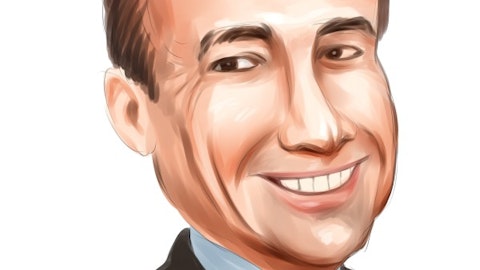In this article, we discuss the 5 most profitable biotech companies in the world. In order to read our detailed analysis of the biotech industry, its history, performance, and outlook for future growth, go directly to 10 Most Profitable Biotech Companies in the World.
5. Roche Holding AG (OTC:RHHBY)
Number of Hedge Fund Holders: 3
Net Income (TTM): $15.09 billion
Roche Holding AG (OTC: RHHBY) is one of the largest and most profitable biotech firms in the world. The Switzerland-based company provides treatments for cancer, hepatitis, HIV/AIDS, and anemia, as well as for diseases in the areas of ophthalmology, dermatology, and immunology among others. The firm also provides the research market with diagnostic instruments and test kits and is also one of the leading manufacturers of COVID-19 tests. Founded in 1896, Roche Holding AG (OTC: RHHBY) has a long history of delivering groundbreaking biotech products.
Roche Holding AG (OTC: RHHBY) was the first company to mass-produce synthetic vitamin C, under the brand name Redoxon in 1934. Roche is also the leading provider of cancer treatments around the world. It developed the tranquilizer drug class called benzodiazepines, with antidepressants Valium and Rohypnol the most famous names under this drug family. Roche Holding AG (OTC: RHHBY) is also the sole authorized manufacturer of a bird flu drug called Oseltamivir, which was discovered by Gilead Sciences.
Revenue for 2021 for the biotech giant stood at $72.04 billion, signaling an increase of 11.94% year on year. Fisher Asset Management of billionaire Ken Fisher was the top shareholder of Roche Holding AG (OTC: RHHBY) in the fourth quarter, with 4.65 million shares valued at $242.3 million.
Harding Loevner, an investment firm, talked about Roche Holding AG (OTC: RHHBY) in its Q4 2021 investor letter. The fund said:
“Health Care boosted relative performance as our holdings benefitted from the pandemic both coming and going. Roche and Lonza saw heightened interest in treatment, testing, and vaccination activities to battle the waves of newer COVID-19 variants.
4. Johnson & Johnson (NYSE:JNJ)
Number of Hedge Fund Holders: 83
Net Income (TTM): $20.87 billion
Johnson & Johnson (NYSE:JNJ) is a pharmaceutical giant that features next on our list of the most profitable biotech companies. The New Jersey-based company offers products through three segments: Consumer Products, Medical Devices, and Pharmaceutical. The pharmaceutical products include treatments for neuroscience, oncology, pulmonary hypertension, and cardiovascular and metabolic diseases, as well as immunology and infectious diseases.
In March, The New York Times reported that although once dismissed as less effective than Pfizer’s and Moderna’s Covid vaccine, Johnson & Johnson’s (NYSE:JNJ) Covid vaccine seems to be preventing infections and illness just as good as its competitors, with recent data suggesting that “punches above its weight for a single-dose vaccine.” In 2021, the firm was awarded a contract by the US government to provide 100 million doses of its single-shot Covid vaccine.
In 2020, Johnson & Johnson (NYSE: JNJ) acquired Momenta Pharmaceuticals, which deals in the discovery and development of novel therapies for immune-mediated diseases. This $6.5 billion deal will expand Johnson & Johnson’s (NYSE: JNJ) biotech portfolio in the field of autoimmune disorder treatments.
Johnson & Johnson (NYSE: JNJ) reported a revenue of $93.77 billion for 2021, increasing 13.55% from its revenue of $82.58 billion for 2020. Fundsmith LLP held 7.21 million shares worth $1.23 billion in Johnson & Johnson (NYSE: JNJ) over the fourth quarter, making it the largest shareholder of the firm.
Distillate Capital, an investment firm, talked about Johnson & Johnson (NYSE:JNJ) in its Q2 2021 investor letter. The fund said:
“The largest additions in the rebalance, Johnson & Johnson was around 50 and 40 basis points incrementally. J&J underperformed in the quarter while its normalized free cash flows held steady and so its position size was topped off to match the stable cash flows.”
3. Pfizer Inc. (NYSE:PFE)
Number of Hedge Fund Holders: 83
Net Income (TTM): $21.97 billion
Pfizer Inc. (NYSE:PFE) is up next on our list of the most profitable biotech firms. It was founded in 1849 by Charles Pfizer, and currently produces several medicinal products with annual revenues of more than $1 billion. The firm has shot to mainstream prominence after producing its Covid-19 vaccine in partnership with BioNTech. As of March 2022, 331 million doses of its vaccines have been administered in the United States. It pledged to manufacture 3 billion doses in total for the year of 2021, and generated $36 billion in vaccine sales for the year. Along with competitor Moderna, Pfizer Inc. (NYSE:PFE) in late March received US Food & Drug Administration Authority (FDA) approval for the second booster dose of its Covid vaccine.
As part of its strategy to solidify its leadership in drug development and discovery, Pfizer is investing $500 million towards clinical research and drug development programs through the Pfizer Breakthrough Growth Initiative. United Nations-backed Medicines Patent Pool (MPP) in March announced that 35 generic drug manufacturers around the world have agreed to produce cheap versions of Pfizer Inc.’s (NYSE:PFE) Paxlovid oral pill, which will be distributed to 95 low-income countries across the globe. The firm’s revenue for 2021 was recorded at $81.49 billion, a jump of 94.45% in comparison to 2020.
Saturna Capital, an investment firm, talked about Pfizer Inc. (NYSE:PFE) in its Q3 2021 investor letter. The fund said:
“The Fund’s strongest performer during the quarter was pharmaceutical manufacturer Pfizer Inc. (NYSE:PFE). The company submitted trial data to the FDA for use of its COVID-19 vaccine for younger children, and it is widely expected that the FDA will approve it. Health authorities also began recommending booster shots of the Pfizer vaccine for select populations, further increasing demand for vaccinations.”
2. Novartis AG (NYSE:NVS)
Number of Hedge Fund Holders: 25
Net Income (TTM): $24.02 billion
Novartis AG (NYSE:NVS) is one of the largest biopharmaceutical firms in the world. It is based in Switzerland, and offers a range of therapies for diseases in the therapeutic areas of ophthalmology, neuroscience, immunology, hepatology, dermatology, respiratory and cardiovascular. In December 2021, Novartis AG (NYSE:NVS) announced that over the next five years, it was expecting sales growth of at least 4% owing to growing demand for new drugs. In these five years, Novartis expects the approval of 20 new drug products with sales potential of more than $1 billion. In 2020, medical products by Novartis AG (NYSE:NVS) reached 800 million people around the globe.
On March 23, Novartis announced that the US Food and Drug Administration (FDA) approved its cancer drug called Pluvicto, which treats adults with a certain type of advanced prostrate cancer. In 2019, Novartis AG (NYSE:NVS) announced a strategic partnership with Microsoft, in a bid to leverage the firm’s AI capabilities to accelerate drug discovery for patients around the world. Microsoft is helping Novartis’ scientists with cutting-edge technology platforms that use algorithms to find trends and patterns within huge sets of data, and thereby fasten the drug discovery process.
Novartis AG (NYSE:NVS) posted an annual revenue of $52.87 billion for 2021, showing a 5.97% increase from the previous year. Out of all the hedge funds tracked by Insider Monkey, Fisher Asset Management was the leading shareholder in Novartis AG (NYSE:NVS), with a stake consisting of 10.38 million shares valued at $908.34 million.
Investment firm Oakmark Funds mentioned Novartis AG (NYSE:NVS) in its Q4 2020 investor letter. The fund said:
“Novartis is one of Europe’s largest pharmaceutical companies and possesses a highly diversified portfolio of innovative products. Its share price underperformed both the broader market and its pharma peers during 2020, largely due to a few disappointing late-stage trials and the company’s lack of Covid-19-related therapeutics or vaccines. These short-term issues provided us with an attractive entry point to invest in a leading pharmaceutical franchise with compelling economics. We estimate that the market is currently ascribing almost no value to Novartis’ pipeline despite the company’s excellent track record in new drug development. We expect that Novartis will deliver mid-single-digit, top-line growth and expand margins over the next five years as a result of its cost-savings plan. The company possesses one of the most diversified product portfolios in the pharma industry with 15 $1b+ compounds, which reduces its reliance on any single compound.”
1. Novo Nordisk A/S (NYSE:NVO)
Number of Hedge Fund Holders: 28
Net Income (TTM): $47.75 billion
Novo Nordisk A/S (NYSE:NVO) is a Danish company that specializes in treatments for diabetes. As the disease becomes more prevalent around the globe owing to sedentary lifestyles, Novo Nordisk A/S (NYSE:NVO) is poised to take advantage as an industry leader in insulin treatments. The firm also provides treatments for haemophilia, growth disorders, and hormone replacement therapy. It boasts production facilities in 8 countries and employs more than 45,000 people around the globe.
85% of Nordisk’s business comes from selling its diabetes treatments. In 2002, it founded the The World Diabetes Foundation which aims to alleviate suffering from diabetes around the globe by providing funding for prevention and care projects in low and middle-income countries.
Novo Nordisk A/S (NYSE:NVO) is a pioneer in gene engineering technology. The company initially extracted insulin from the pancreatic glands of pigs in 1923, when it first commercialised the production of insulin. Using gene editing technology, the firm managed to convert the pig insulin into human insulin by 1982. Five years later in 1987, Novo Nordisk A/S (NYSE:NVO) produced human insulin from yeast cells, eliminating the need for pig glands. Nordisk has not only produced a wide variety of insulin variants, but developed new strains of yeast which produce larger quantities of yeast whilst also lowering the consumption of raw materials.
Deutsche Bank analyst Emmanuel Papadakis gave Novo Nordisk A/S (NYSE:NVO) a ‘Buy’ rating on March 16, noting that the firm looks well-positioned to enjoy another decade of leadership in diabetes medicine. Novo Nordisk A/S (NYSE:NVO) posted an annual revenue of $22.40 billion for 2021, showing a 15.18% increase from 2020.
Investment firm LRT Capital Management talked about Novo Nordisk A/S (NYSE:NVO) in its Q4 2021 investor letter. The fund said:
“Novo Nordisk is the global leader in insulin, which is, sadly, a growing business as more and more people around the world suffer from diabetes. Millions of people need daily injections of insulin to stay alive, a number that, unfortunately, is likely to continue to grow by millions more in the coming decade. It may seem at first glance that insulin should be a commoditized business, after all, it was discovered and synthesized over a hundred years ago, but nothing could be further from the truth. There are many types of insulin and Novo Nordisk has spent billions on R&D over the years to develop new products. On February 11th, the company reported favorable results from a phase-3 trial of Semaglutide, a drug that is currently used for Type 2 diabetes treatment. The study evaluated the use of Semaglutide for weight loss treatment in non-diabetic patients and found a significant impact on weight loss for patients receiving Semaglutide vs. the placebo control group. If Semaglutide is approved for weight loss treatment, we expect it will be meaningfully accretive to the company’s bottom line.
The company’s proprietary product line supports returns on invested capital of over 40%, and while sales growth is relatively slow (+6% annualized CAGR over the past decade), the company’s shares trade at a reasonable valuation of only 22x forward earnings. For a company with an extremely predictable business, high returns on capital, and an easily forecastable future, we believe this to be highly attractive.”
You can also take a look at 15 Biggest Real Estate Companies In The World and 10 Cheap Healthcare Stocks To Buy Now.




